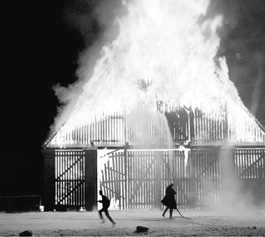home | metro santa cruz index | movies | current reviews | film review

HEAT'S ON: Strange happenings throw a wrench in village life in 'The White Ribbon.'
Fade to Black
'The White Ribbon' is a gorgeous cinematic riddle on the theme of repression
By Christina Waters
PULVERIZINGLY beautiful, The White Ribbon has won big at Cannes and been nominated for two Oscars, and yet even those honors scarcely convey the magnitude of this cinematic achievement by the Austrian director Michael Haneke. As a forensic allegory of hypocrisy, longing, and disappointment, The White Ribbon owns a place on the short list of all-time unforgettable films.
In a German village on the verge of World War I, a series of random events ignites suspicion, violence and strange punishment. The ripening mood of paranoia and retaliation tears apart the village fabric, until the messes are covered up and control regained. A story of psychological oppression, this new film by the director of The Piano Teacher takes its name from a symbol of innocence and purity tied around the arms of village children as a reminder of their duties. What unfolds through Christian Berger's exquisite black and white photography—he frequently uses ambient light and a stationary camera to thrust us into the secret heart of each scene—deepens our own sense of political foreboding.
The village schoolteacher, now an old man, recalls the events of a certain year in which the planting and harvesting rhythms of village life have begun to unravel. Accidents begin to occur, each one leading to recrimination and unexpected revenge. No one seems to know what has occurred or who has done it. "I don't know"—Ich weiss nicht—is the disclaimer we hear over and over as the film delves methodically into malicious taunting, beatings, abuse and psychological cruelty staining the neat, orderly structure of village life.
James Cameron needed special effects and 3-D. In The White Ribbon, Haneke does even more without the distraction of color. Ravishing in every detail, The White Ribbon might have been designed by Edvard Munch in consultation with Ingmar Bergman. Berger's camera glides down hallways, stopping in doorways while we listen to the whispers just out of view. What happens behind the closed doors remains obscured—we hear without seeing. Every sensation is heightened. On the infrastructure of taut, spare performances, the astonishingly composed shots gleam like marble sculpture. Figures in long white nightgowns disappear into darkened interiors that in turn fade to black. The polite, hygienic veneer of the village conceals more than even the brooding uncertainty implies. Paring down script and gesture, just as he removes color in order to more clearly reveal the texture of repression, Haneke offers us a cycle of rigidly defined life. The seasons, courtship, music, hormones, boredom—all are played out against the distinctions of class, education and gender. Women are loved and used by men, peasants are used and neglected by the wealthy, religion uplifts the soul and terrorizes the heart.
Disarming us with its beauty, The White Ribbon unveils its darker purpose, a view of repression that we couldn't have prepared for. The film's prevailing mood of mystery is so effective that only at the end do we realize we have been led into a snare of spiritual decay. With joy and freedom beaten out of them, the young villagers—these children who will be Germany's adults in 1933, 1941, 1945—are primed for lives in which there is no moral compass, no ethical impulse. They already, The White Ribbon suggests, live beyond good and evil. Anything could be allowed. And, as German history revealed, anything was.
Yet the power of this film, in the end, also lies in Haneke's rejection of reductionism. We remain embedded in a web of effects with countless causes. Innocence has seeped away. Only guilt and rage remain. The White Ribbon is a film of malevolent beauty whose ability to trouble our own assumptions seems to increase long after viewing.
THE WHITE RIBBON (R; 144 min.) directed and written by Michael Haneke, photographed by Christian Berger and starring Christian Friedel, opens Friday at the Nickelodeon in Santa Cruz.
Send a letter to the editor about this story.
|
|
|
|
|
|